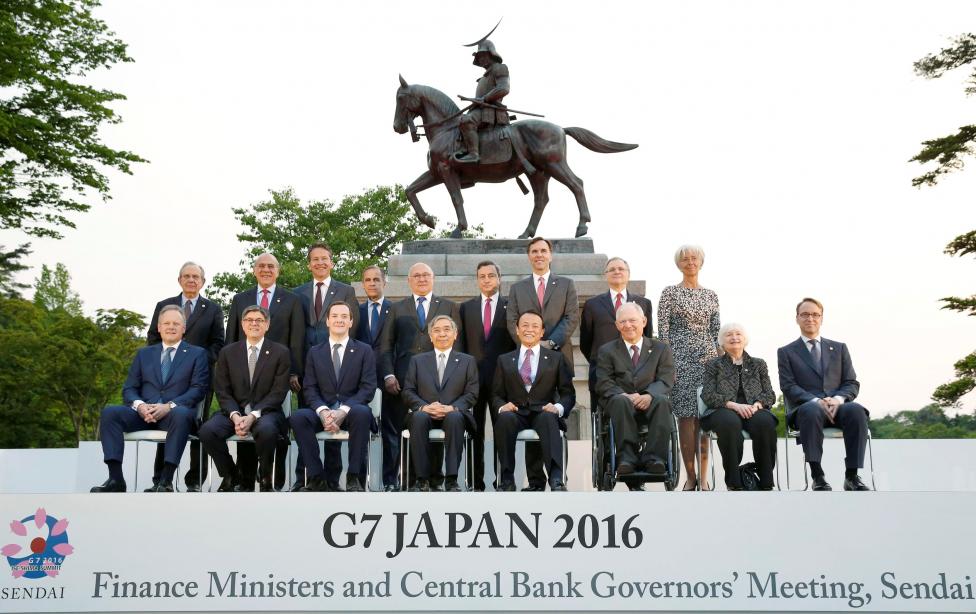The Group of Seven major economies committed on Saturday to take more aggressive action to combat financing of terrorism and violent extremism that jeopardize global stability.
Finance leaders of the Group of Seven (G7) issued an “action plan” following a two-day discussion in northern Japan calling for increased exchanges of information on financial intelligence, reducing the level of cross-border transactions subject to disclosure and collaborate on targeted sanctions for terrorists’ financial networks.
A G7 summit in central Japan’s Ise region is scheduled for next week.
The officials spent Friday deliberating over ways to use monetary policy, government spending and longer-term reforms to help support growth.
“All of us were really able to have a candid discussion and to reaffirm the important role of the G7,” said Japanese Finance Minister Taro Aso.
Having agreed to only tacit coordination of their varying strategies for boosting growth, the G7 finance meeting turned Saturday to issues such as terrorist financing, tax evasion and support for fighting pandemics.
Despite the differences Aso acknowledged with the U.S. over issues such as exchange rates, he insisted there was no overt friction after his meeting with U.S. Treasury Secretary Jacob Lew.
“They have their own position. They have an election coming and we also have an election coming,” he told reporters. “We have to say what we think to each other because it’s business. It’s normal to exchange views and ensure things will not go awry because issues become too emotional.”
Lew said Friday he hoped the talks would keep heading in the right direction commitments made during recent discussions in China by the wider Group of 20 major economies, where members promised to not manipulate exchange rates to their own advantage.
A recent rise in the value of the Japanese yen against the U.S. dollar is adding to pressures on Japanese companies who had reaped record profits as the yen weakened in recent years, fattening earnings brought back to Japan in yen terms.
Japan and other G7 countries reaffirmed their commitment not to engage in “competitive devaluation of currencies.” But Aso has hinted at the possibility of intervention if the yen’s fluctuations are seen to be too “disorderly.”
The Japanese finance minister also made light of suggestions of major differences over the leeway for more government spending by countries struggling to keep deficits under control, saying each country must adapt policies to suit their own troubles and finances.
Most of the governments of the G-7 favor more pro-active government spending to help support dwindling growth, while Germany has remained more conservative on fiscal matters, regarding structural reforms as crucial.
Officials said the only consensus reached was that while there is no one-size-fits-all approach, all economies are facing a stifling lack of demand, as factories churn out more cars, clothing and computers than consumers are willing to buy.
The talks also touched on nonfinancial risks to growth, such as the refugee crisis, terrorism and a looming referendum in Britain over whether or not to leave the European Union. Such a move is viewed as likely to cause major disruptions both in Europe and in global financial markets.
The World Bank, whose president Jim Yong Kim, is attending the talks, launched Saturday a financing mechanism that creates an insurance market for risk from pandemics.
It said Japan would provide $ the first 50 million to fund the $500 million facility, which will combine funding from reinsurance markets with the proceeds of a new type of World Bank-issued high-yield pandemic “catastrophe” bond, the bank said.
In the event of a pandemic outbreak, the facility will release funds quickly to affected poor countries and qualified international first-responder agencies.
The genesis of the new facility was the slow international response to the Ebola outbreak in 2014, when it took months to collect meaningful funds for affected countries as death tolls mounted.
“The recent Ebola crisis in West Africa was a tragedy that we were simply not prepared for. It was a wake-up call to the world,” World Bank President Jim Yong Kim told a media conference call.
“We can’t change the speed of a hurricane or the magnitude of an earthquake, but we can change the trajectory of an outbreak. With enough money sent to the right place at the right time, we can save lives and protect economies,” Kim added.
The facility was developed in conjunction with the World Health Organization and reinsurers Swiss Re and Munich Re, which are acting as insurance providers.
